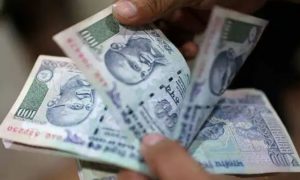India’s fiscal deficit had stood at 6.7 per cent in the previous financial year 2021-22
The government aims to remain on course for a 6.4 per cent fiscal deficit in the current financial year 2022-23. Higher than budgeted nominal GDP will adjust for additional spend, sources told CNBC-TV18. They said the deficit quantum might be higher but 6.4 per cent is achievable.
The fiscal deficit is the difference between the government’s total expenditure and revenue. The sources also said some increase in the deficit can be managed without additional borrowing and the overall tax revenues are likely to be just on course after the excise cuts. The government is also likely to seek Parliament’s nod for additional spend on food, fertiliser, LPG subsidy in the next session.
Read More: 5G Spectrum Auction Starts Today: What Is 5G, Which 5G Bands Will Be Used In India And Other FAQs
Presenting the annual budget in February, Finance Minister Nirmala Sitharaman fixed the fiscal deficit target at 6.4 per cent of the GDP for the current financial year 2022-23, compared with 6.7 per cent in the previous fiscal year.
During April-May 2022, the country’s fiscal deficit during touched Rs 2,03,921 crore, or 12.3 per cent of the target for the entire current financial year, mainly due to higher expenditure. The total receipts at the end of May stood at Rs 3.81 lakh crore or 16.7 per cent of the FY23 BE, while the total expenditure was at Rs 5.85 lakh crore or 14.8 per cent of this year’s BE.
The fiscal deficit had stood at 8.2 per cent of the FY22 budget estimate (RE) during the corresponding period a year ago. For the full financial year 2022-23, the fiscal deficit of the government is estimated at Rs 16,61,196 crore.
On the current account deficit (CAD) also, Finance Minister Nirmala Sitharaman has said the government is carefully monitoring the situation as the crude oil price is rising and gold imports remain high. The government recently raised customs duty on gold from 10.75 per cent to 15 per cent, to curb gold imports that is likely to reduce CAD.
The country’s CAD had stood at 1.2 per cent of GDP in 2021-22 against a surplus of 0.9 per cent in the previous year, due to a wider trade deficit. For the January-March 2022 quarter, the CAD had narrowed on a sequential basis to $13.4 billion or 1.5 per cent of GDP against $22.2 billion or 2.6 per cent of GDP in the December 2021 quarter.
India’s trade deficit during June 2022 stood at $26.18 billion in June 2021. The merchandise exports during the month jumped 23.52 per cent year-on-year to $40.13 billion, while imports increased 57.55 per cent to $66.31 billion. In April-June 2022, the cumulative exports rose about 24.51 per cent to $118.96 billion, while imports increased 49.47 per cent to $189.76 billion during the period.
The trade deficit during the first three months of this fiscal widened to $70.80 billion from $31.42 billion in the year-ago period.





































